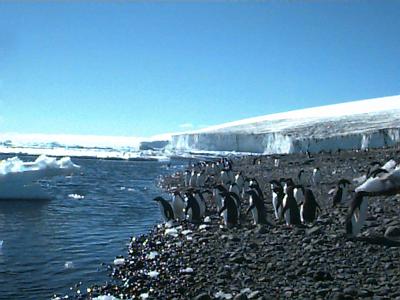12 January, 2000
Today as I walked along the shore, I was lucky to witness a Leopard
Seal attack a penguin. I was watching a group of Adelies when I heard
a loud splashing just offshore. When I looked, I could see the head of
the Leopard just above water with a penguin in its jaws. The seal
thrashed back and
forth then dove under with the prey. A moment later it resurfaced,
thrust its head above water, opened its gaping jaws and swallowed a big
chunk of meat. A moment later, the seal rocketed out of the water onto
a nearby iceberg. There was a small group of Adelies on the berg, which
promptly jumped back into the water. The seal followed not to return. I
took a few steps back from the beach in a amazement and with the
thought that I didn't want to end with the same fate of the penguin.
Leopard seals are known to also feed on Weddell seals which are
considerably larger than humans. Now I understood the caution that the
Adelies always show before entering the water. Watching them, it is
obvious that they are terrified of the sea, even though they swim as
well as any fish. Before entering the water they wait until there is a
big group ready to feed. Penguins are not leaders when it comes to
going into the water. They will pack together in a funnel shaped mass
of birds along the beach. This group tapers to the tip of the funnel, an
unlucky bird which stands on the waterline. As the penguins prepare to
enter, they grunt to each other. The intensity of the grunting grows
louder and louder until they all seem to be psyched up to get into the
water. A powerful group dynamic occurs, and either the leader goes for
it and dives in, or chickens out and runs to the back of the group,
leaving another unlucky individual to the the leader. I suppose being
the first in a pack of penguins is not the safest place to be if there
is a Leopard seal prowling nearby. There is much less chance of being
the victim if you are in the middle of the pack.
Sometimes the leader is parcticularly deceptive, or perhaps it senses
something at the last second. These birds will dive in then immediately
turn around and get out of the water while the rest of the pack
continues into the sea. Though not parcticularly brave or noble in human
terms, I suppose these tricksters stand a good chance of surviving, and
thus pass on this behavior to their offspring. Between the Leopard
seals and the Orcas patrolling the waters offshore, any behavior that
puts a penguin at risk will not last long, as the penguin will be
eaten. Not a good way to to live another day, let alone pass on their
genes.

These penguins are trying to build up the nerve to enter the water. When they are all psyched up, they will grunt and growl together, then enter en mass. They are very cautious about entering as Leopard seals are common prowlers of the pack ice.
Contact the TEA in the field at
.
If you cannot connect through your browser, copy the
TEA's e-mail address in the "To:" line of
your favorite e-mail package.
|
